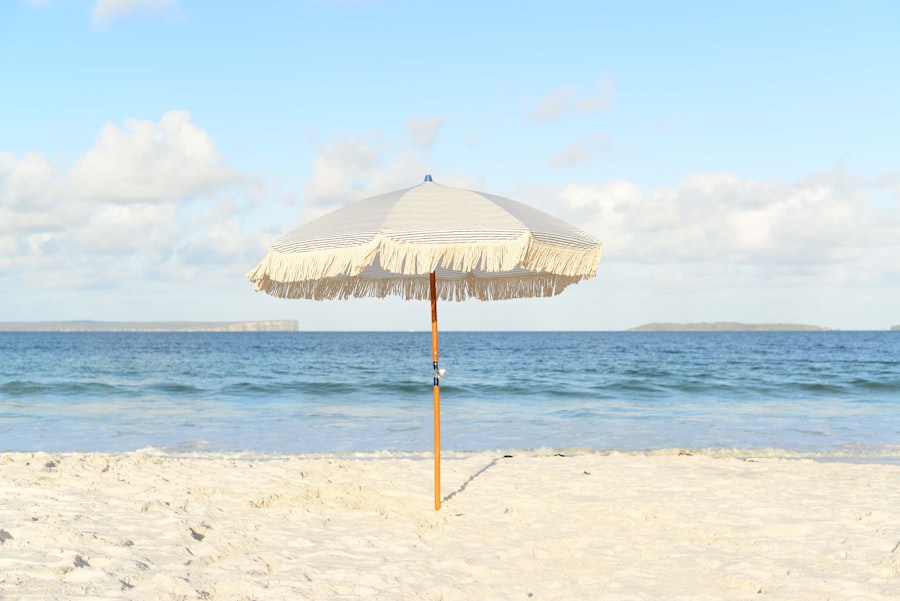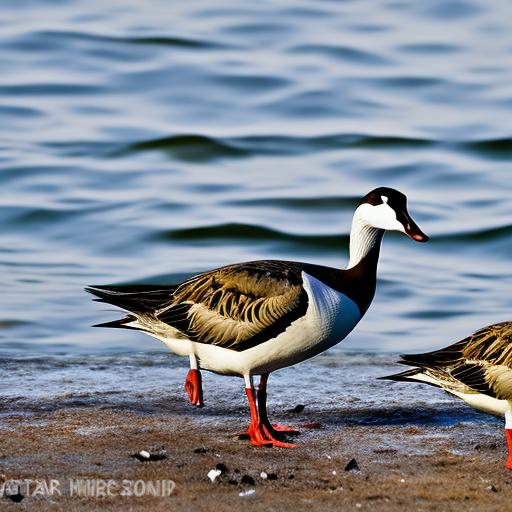Geese infestation on beaches is a common problem that many beach owners and managers face. These large birds can cause damage to the beach environment, create unsightly messes, and even pose a threat to beach-goers. Finding humane solutions to deter geese is crucial in order to maintain a clean and safe beach environment for everyone to enjoy.
Key Takeaways
- Canadian geese are attracted to open spaces near water and grassy areas.
- Physical barriers such as fences and netting can be effective in deterring geese.
- Natural repellents like grape concentrate and predator urine can also keep geese away.
- Creating a hostile environment by removing food sources and using decoys can discourage geese from staying on your beach.
- Regular maintenance like cleaning up trash and mowing grass can prevent geese from infesting your beach.
Understanding the Behavior of Canadian Geese
Canadian geese are known for their distinctive appearance, with their long necks and black heads. They are migratory birds that often travel in large flocks. Geese are attracted to beaches for several reasons. Firstly, beaches provide open spaces with easy access to water, which is essential for their survival. Additionally, beaches often have lush grassy areas that geese find appealing for grazing.
Implementing Physical Barriers to Deter Geese
One effective way to keep geese away from beaches is by implementing physical barriers. There are several types of barriers that can be used, such as fences, netting, and hedges. Fences can be installed around the perimeter of the beach to prevent geese from entering. Netting can be placed over grassy areas to make it difficult for geese to access the food source. Hedges can also be planted as a natural barrier to deter geese.
Each type of barrier has its pros and cons. Fences are effective at keeping geese out, but they may not be aesthetically pleasing and can obstruct the view of the beach. Netting is a cost-effective option, but it may require regular maintenance to ensure it remains intact. Hedges provide a natural and visually appealing barrier, but they may take time to grow and require regular trimming.
Utilizing Natural Repellents to Keep Geese Away
Natural repellents can also be used to deter geese from beaches. There are several options available, such as citrus sprays, predator urine, and reflective tape. Citrus sprays can be applied to grassy areas to make them less appealing to geese. Predator urine, such as coyote or fox urine, can be sprayed around the perimeter of the beach to create a sense of danger for geese. Reflective tape can be hung around the beach to create a visual deterrent for geese.
When using natural repellents, it is important to follow the instructions carefully and reapply as needed. Citrus sprays may need to be reapplied after rain or heavy watering. Predator urine should be reapplied regularly to maintain its effectiveness. Reflective tape should be hung in areas where it will catch the sunlight and create a deterrent effect.
Creating a Hostile Environment for Geese on Your Beach
In addition to physical barriers and natural repellents, there are several things that can be done to create a hostile environment for geese on your beach. One effective method is to remove or reduce their food sources. This can be done by regularly mowing grassy areas to make them less appealing for grazing. It is also important to clean up any food scraps or trash that may attract geese.
Another method is to make the beach environment less attractive for geese. This can be done by removing any standing water or puddles that geese may use for bathing or drinking. Additionally, planting native vegetation that is unappealing to geese can help deter them from the beach.
Establishing a Routine Maintenance Plan to Prevent Geese Infestation

Regular maintenance is crucial in preventing geese infestation on beaches. This includes regular mowing of grassy areas, cleaning up food scraps and trash, and removing standing water or puddles. It is important to establish a maintenance plan that works for your beach and allocate resources accordingly.
A routine maintenance plan should include regular inspections of the beach area to identify any potential issues or areas that may attract geese. It is also important to have a schedule for mowing and cleaning up the beach. Regular communication with staff and beach-goers can help ensure that everyone is aware of the importance of maintaining a clean and goose-free beach environment.
Educating Beach-Goers on Proper Geese Interaction
Educating beach-goers on how to properly interact with geese is essential in preventing conflicts and ensuring the safety of both humans and geese. It is important to inform beach-goers that feeding geese is not only harmful to the birds but also encourages them to stay in the area. Signs can be posted around the beach to remind visitors not to feed the geese.
Additionally, it is important to educate beach-goers on how to safely navigate around geese. This includes giving geese a wide berth and avoiding any aggressive behavior towards them. It is also important to teach children not to approach or chase geese, as this can cause stress and potentially lead to aggressive behavior from the birds.
Seeking Professional Assistance for Geese Control
In some cases, it may be necessary to seek professional assistance for geese control. This is especially true if other methods have been unsuccessful or if the infestation is severe. There are professional geese control services that specialize in humane methods of deterring geese from beaches.
These professionals have the knowledge and experience to assess the situation and implement effective solutions. They may use a combination of physical barriers, natural repellents, and other methods to deter geese from the beach. It is important to choose a reputable and experienced professional who understands the importance of humane solutions.
Installing Visual Deterrents to Scare Off Geese
Visual deterrents can be effective in scaring off geese from beaches. There are several options available, such as scarecrows, decoy predators, and reflective devices. Scarecrows can be placed strategically around the beach to create a sense of danger for geese. Decoy predators, such as plastic owls or coyotes, can be placed in areas where geese are known to congregate.
Reflective devices, such as shiny balloons or strips of reflective tape, can be hung around the beach to create a visual deterrent for geese. These devices create movement and reflections that can scare off geese. It is important to regularly move and change the location of visual deterrents to prevent geese from becoming accustomed to them.
Implementing Sound-Based Solutions to Keep Geese at Bay
Sound-based solutions can also be effective in keeping geese away from beaches. There are several options available, such as sonic devices, ultrasonic devices, and noise-making devices. Sonic devices emit loud noises or predator calls that can scare off geese. Ultrasonic devices emit high-frequency sounds that are unpleasant for geese.
Noise-making devices, such as air horns or whistles, can also be used to startle geese and make them uncomfortable. It is important to use sound-based solutions sparingly and strategically, as constant noise may become ineffective over time.
Developing a Comprehensive Geese Management Strategy for Your Beach
Developing a comprehensive geese management strategy is crucial in effectively deterring geese from beaches. This strategy should include a combination of physical barriers, natural repellents, routine maintenance, education for beach-goers, and potentially seeking professional assistance.
It is important to assess the specific needs and challenges of your beach and tailor the strategy accordingly. Regular evaluation and adjustment of the strategy may be necessary to ensure its effectiveness. By implementing a comprehensive geese management strategy, you can maintain a clean and safe beach environment for everyone to enjoy.
In conclusion, geese infestation on beaches is a common problem that requires humane solutions. Understanding the behavior of Canadian geese and implementing physical barriers, natural repellents, and other deterrents can help keep geese away from beaches. Creating a hostile environment, establishing a routine maintenance plan, educating beach-goers, seeking professional assistance when needed, and developing a comprehensive geese management strategy are all important steps in effectively deterring geese. By finding humane solutions to deter geese, we can maintain clean and safe beach environments for everyone to enjoy.
If you’re looking for effective ways to keep Canadian geese off your beach, you might also be interested in learning about how to create a secure and comfortable floor for your chicken coop. A well-designed coop floor not only provides a clean and hygienic environment for your chickens but also helps keep predators at bay. Check out this informative article on poultrywizard.com that offers valuable insights and tips on creating the perfect floor for your chicken coop: https://poultrywizard.com/keeping-chickens/floor-of-chicken-coop/. By implementing these strategies, you can ensure the safety and well-being of your feathered friends while keeping unwanted visitors away from your beach.
FAQs
What are Canadian geese?
Canadian geese are a species of waterfowl that are native to North America. They are known for their distinctive black heads and necks, white cheeks, and brown bodies.
Why do Canadian geese come to beaches?
Canadian geese are attracted to beaches because they provide easy access to water and food sources such as grass and insects. They also provide a safe place for geese to rest and raise their young.
What problems can Canadian geese cause on beaches?
Canadian geese can cause a number of problems on beaches, including leaving behind large amounts of droppings that can be unsightly and unsanitary. They can also be aggressive towards humans and other animals, and their presence can disrupt other wildlife in the area.
What are some methods for keeping Canadian geese off your beach?
There are several methods for keeping Canadian geese off your beach, including using decoys or scare tactics such as loud noises or flashing lights. Physical barriers such as fences or netting can also be effective. It is important to note that it is illegal to harm or kill Canadian geese without a permit.
What should I do if I encounter a Canadian goose on the beach?
If you encounter a Canadian goose on the beach, it is important to keep a safe distance and avoid approaching or feeding the bird. If the goose appears aggressive or is blocking your path, it is best to find an alternate route or wait for the bird to move on its own.
Meet Walter, the feathered-friend fanatic of Florida! Nestled in the sunshine state, Walter struts through life with his feathered companions, clucking his way to happiness. With a coop that’s fancier than a five-star hotel, he’s the Don Juan of the chicken world. When he’s not teaching his hens to do the cha-cha, you’ll find him in a heated debate with his prized rooster, Sir Clucks-a-Lot. Walter’s poultry passion is no yolk; he’s the sunny-side-up guy you never knew you needed in your flock of friends!







